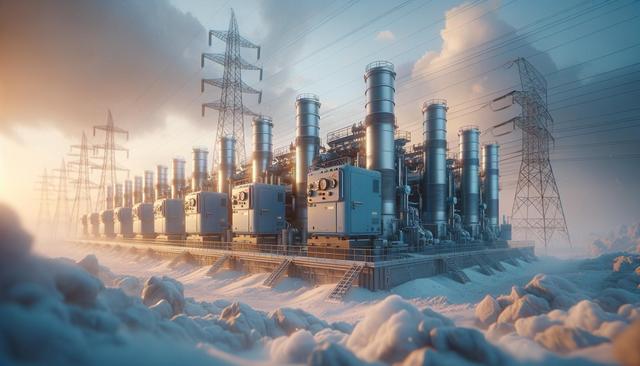The Role of Diesel Generators in Industrial Applications
In industrial settings where power demands are high and continuous operation is critical, diesel generators play a pivotal role. They are widely used in manufacturing plants, construction sites, mining operations, and processing facilities. The primary appeal lies in their ability to deliver dependable power during outages or in areas without access to a central electric grid. Diesel generators are often selected for their robust performance and durability under demanding conditions, making them essential for maintaining productivity and safety. Their application is particularly valuable in operations where downtime could result in significant financial losses or safety risks. These generators also support peak shaving, where facilities reduce their reliance on grid electricity during high-demand periods, thereby optimizing operational costs.
Industries rely heavily on diesel generators for:
- Emergency backup during grid failures
- Powering heavy machinery and processing equipment
- Providing energy for temporary or mobile operations
- Ensuring uninterrupted work in critical environments like hospitals and data centers
Understanding The Role of Diesel Generators in Industrial Applications helps businesses make informed decisions when planning for power resilience and reliability.
Essential Specifications to Consider
When selecting a diesel generator, it is crucial to evaluate specific technical and operational characteristics. These specifications influence performance, efficiency, and suitability for various operational needs. Important considerations include power output (kW or kVA), fuel consumption rates, noise levels, runtime, and total harmonic distortion. Additionally, modern generators often come equipped with advanced features such as digital control systems, automatic transfer switches (ATS), and remote monitoring capabilities. These attributes enhance usability and integration within broader energy systems.
Key factors under Essential Specifications to Consider include:
- Power capacity relative to intended load
- Fuel efficiency and tank size for extended operation
- Compliance with emission regulations
- Cooling mechanisms and ventilation requirements
- Availability of spare parts and service support
Evaluating these specifications ensures the selected generator aligns with both current and future power needs, minimizing operational disruptions and maintenance costs.
Installation and Setup for Backup Power
Proper installation and setup are vital for ensuring effective and safe operation of diesel generators. This process involves several steps, starting with site assessment and load analysis. Based on this information, professionals determine the optimal location for the generator to minimize noise, exhaust emissions, and vibration impacts. The installation should comply with local codes and standards, including adequate spacing for ventilation and accessibility for maintenance. Electrical connections must be handled by certified technicians to ensure seamless integration with the facility’s power infrastructure.
To achieve a reliable system under Installation and Setup for Backup Power, consider the following:
- Use of automatic transfer switches for instant power shift during outages
- Installation of fuel storage and handling systems
- Implementation of grounding and surge protection measures
- Regular system testing and load banking to verify functionality
- Clear labeling and safety signage at the generator site
A well-planned setup not only extends the generator’s lifespan but also ensures quick power restoration when it’s needed most.
Powering Large-Scale Commercial Operations
Large-scale commercial operations, such as shopping centers, office complexes, and entertainment venues, demand consistent and scalable power solutions. Diesel generators offer a practical way to support these facilities, especially during peak seasons or emergency situations. They can be configured in parallel setups to meet higher load demands while offering flexibility in power management. Moreover, diesel generators are often favored in commercial environments for their ability to start quickly and run for extended periods without interruption.
In the context of Powering Large-Scale Commercial Operations, diesel generators contribute to:
- Maintaining lighting, HVAC, and security systems
- Supporting IT infrastructure and communication networks
- Powering elevators, escalators, and refrigeration units
- Ensuring business continuity during utility outages
Commercial facilities can benefit from implementing energy management strategies that include diesel generators as a key component of their contingency planning and sustainability goals.
Power Solutions for Remote and Harsh Environments
Diesel generators are particularly valuable in environments where access to the power grid is limited or non-existent. Remote construction projects, off-grid research stations, and rural communities all rely on diesel generators as a primary or backup energy source. Their rugged construction and adaptability make them well-suited for extreme climates and challenging terrains. Additionally, diesel fuel is often more readily available and easier to transport in these remote areas compared to other fuel types.
Under Power Solutions for Remote and Harsh Environments, diesel generators provide benefits such as:
- Mobility and ease of deployment
- Quick startup and reliable performance in cold conditions
- Scalability through modular generator units
- Compatibility with hybrid systems (solar, wind) for improved efficiency
These features make diesel generators a practical and often indispensable solution for powering mission-critical tasks far from centralized infrastructure.
Conclusion: Choosing the Right Diesel Generator for Your Needs
Diesel generators offer a dependable and flexible power solution across a wide range of applications, from industrial operations to remote fieldwork. When evaluating options, it is essential to understand The Role of Diesel Generators in Industrial Applications, review Essential Specifications to Consider, and ensure proper Installation and Setup for Backup Power. Whether you’re Powering Large-Scale Commercial Operations or seeking Power Solutions for Remote and Harsh Environments, careful planning and specification alignment are key to long-term success. By taking a strategic approach to generator selection and deployment, organizations can enhance operational resilience and maintain continuity even in the most challenging conditions.




Leave a Reply